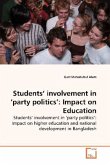"College parties far too often host racially themed parties, inviting students to dress us as stereotypes of racial groups: Indigenous people and white settlers for Columbus Day, for example, or in Black urban streetwear as "gangsters." These events occasionally lead to shocked stories in the national news, but despite all of the embarrassment, these parties persist. This new project from sociologist of education Ingrid A. Nelson explores: how do these parties come to be, and how do institutions respond? And what, if anything, do undergraduates learn about race and racism from these encounters? Yet Another Costume Party Debacle delves into three racist campus parties at Bowdoin College, a top-ranking liberal arts college in Maine. Nelson uncovers the important ways a university's history, policies, and structures persist in allowing racist parties to take place. By Nelson's account, three major factors shape a culture that allows these parties to continue: organizational structures, such as housing, that leave students siloed and segregated, the scripts students make use of to talk about race, and student behaviors. When conversations about race do arise, students wind up talking to people who already agree with them or share their worldview. The scripts for talking about race, too, lead students to prioritize maintaining their reputations over disrupting the status quo, striving above all "not to hurt anyone's feelings." While some might see this as an admirable aim, Nelson instead shows us that it's a missed opportunity for real change. The institutions, scripts, and behaviors that shape responses to racist parties show clearly why racially charged incidents persist on college campuses. To end them, we must take the charge of diversity seriously by changing the structures that bring students together and drive them apart"--
Hinweis: Dieser Artikel kann nur an eine deutsche Lieferadresse ausgeliefert werden.
Hinweis: Dieser Artikel kann nur an eine deutsche Lieferadresse ausgeliefert werden.








